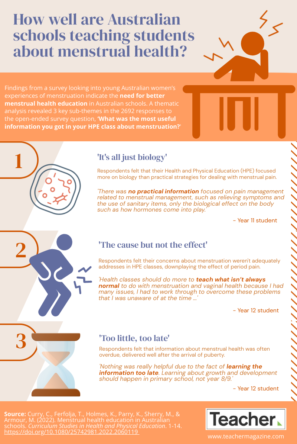Worldwide the age of menarche (onset of menstruation) is declining. As a primary school teacher, reflect on the breadth of menstruation education in your school setting. Is it reserved only for senior students? How prepared and knowledgeable do you feel to have a conversation with a younger student about the topic if it’s needed?
In Australia, 12% of girls will have their first period between the ages of 8 and 11 years, but formal education on menstruation is not included in the national curriculum until age 10 at the earliest, new research from Flinders University reports.
The study involved 15 interviews with school staff (including teachers, principals, a school services officer, and a school counsellor) to explore how girls experiencing early menarche are currently supported in Australian primary schools.
The findings have just been published in the journal Sex Education (Bellas et al., 2023). Co-author Ivanka Prichard – Associate Professor in the College of Nursing and Health Sciences at Flinders University – tells Teacher: ‘It was important to examine what supports are currently available in primary schools in relation to early menarche and to understand staff perceptions around this so that we could make better recommendations about what is needed in order to support young people who experience early menarche.’
What does menstruation education in primary currently look like?
In the interviews, staff were asked about their awareness of students who have experienced early menarche, how their students are educated about periods, and what support is available to them.
‘This method was chosen because this allowed us to explore the perceptions and experiences of staff from primary schools in Australia in a way that questionnaire or numeric data would not have allowed us to do,’ Associate Professor Prichard says.
All participants voiced the need for earlier education about menstruation for students in primary school. The interviews also revealed 3 key themes:
- The prevalence of deficit models of early menarche and children’s capacity to know
- Gendered gatekeeping of menstruation knowledge
- Systemic barriers and inconsistencies in menstruation education
The first theme, the prevalence of deficit models of early menarche and children’s capacity to know, was made clear during interviews where some staff expressed concern about the potential negative effect menstruation might have on students, such as stigma and period pain impacting a student’s attendance. Staff also mentioned their surprise at how many students at their school had begun menstruation in years 4 and 5. Another key finding here was the belief of some staff that younger girls wouldn’t be able to emotionally cope with learning about periods.
Gendered gatekeeping of menstruation knowledge emerged from some staff revealing that male students were not taught at all about female puberty. ‘A few participants said that some boys were not capable of taking on knowledge about menstruation without using it in ways that would be disruptive and result in stigmatising or bullying others,’ the paper says. Participants also mentioned the importance of all children and male staff learning about female puberty and menstruation.
What barriers are teachers facing?
The final theme to emerge from interview data related to systemic barriers and inconsistences in menstruation education teachers face, even when they are motivated to teach young students about menstruation.
‘Some of the current barriers lie around a lack of consistent training for teachers Australia-wide, and that current training is opt-in,’ Associate Professor Prichard explains. ‘Teachers need to be equipped to talk about menstruation in affirming ways at any time, with all students, regardless of age or gender.
‘Some teachers may also feel like younger students may not have the capacity to understand what is going on. But there are ways that we can scaffold information so that if a student does have further questions, they can talk with a trusted teacher.’
The potential of staff being concerned about parent views of menstrual education is another possible barrier, Associate Professor Prichard says. ‘Our research did not look at the opinions of parents, but this is an important avenue for the future.’
Overcoming the barriers to menstruation education
Interviews also revealed the strategies some teachers and schools have employed to support menstruating students. One participant shared that they have created a girls’ group where students can feel free to talk about periods and many other things. Others spoke about keeping their own supply of sanitary products for students.
There are a number of approaches school leaders can be aware of to begin to address barriers to improving menstruation education in their own school settings. For instance, Associate Professor Prichard says consistency is key. ‘Consistent training for teachers would help teachers to be and stay equipped to talk about periods,’ she explains.
‘The Australian Curriculum could introduce specific menstruation education earlier in order to help normalise menstruation. Similar to conversations that teachers might have with their students about appropriate hygiene, they could also speak in a factual manner about what menstruation is, why it happens, the ways it can be managed and how it will begin happening to their peers and that this is normal,’ she adds.
Finally, she says access to practical guides could be provided for teachers, such as SHINE, which is available in South Australia.
‘It’s everyone’s job to be prepared to have conversations about periods and all staff regardless of age or gender need to be ready and prepared to have those conversations.’
Related Teacher content: Improving menstrual health education in schools
References
Bellas, O. M., Mulholland, M. A., Sivertsen, N., Kemp, E., Prichard, I., Velardo, S., & Shipman, J. (2023). Staff perceptions of support for early menarche in Australian primary schools: a qualitative study. Sex Education, 1-15.
In this article, Associate Professor Ivanka Prichard says: ‘Teachers need to be equipped to talk about menstruation in affirming ways at any time, with all students, regardless of age or gender.’
As a classroom teacher, do you feel equipped to talk about menstruation with all students? If not, are you able to identify with any of the barriers that emerged from this research? How could you work with your colleagues to begin to overcome these barriers?
As a school leader, what opportunities are there for staff to be trained in this area? Is the training compulsory or opt-in?



